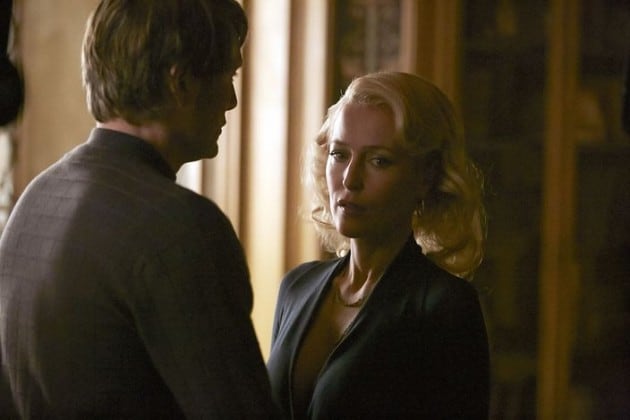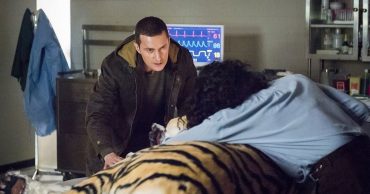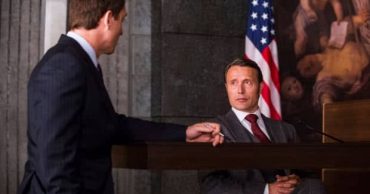
If these reviews have made semi-consistent references to “Mizumono,” it’s because that episode of Hannibal–the Season 2 finale–had such a tremendous impact not only on the series as a whole, but on critical television culture. It is, without exaggeration or misuse of vocabulary, a cinematic masterpiece that is wholly unique among broadcast programming (on cable, Rectify sometimes approaches those artistic heights, but that’s about it). Strangely enough, even though “Mizumono” stands head and shoulders above any other episode of Hannibal, the impact is a culmination of power and not something unprecedented within the series. That is to say that David Slade (director), Bryan Fuller and Steve Lightfoot (co-writers) didn’t do anything new or different in terms of what Hannibal does on a weekly basis in the hour. They just crafted the experience as a climax of all of Hannibal‘s powers and made it the high water mark. “Dolce,” as a whole, isn’t an equal or a successor to “Mizumono,” but many of its triumphs and details recall that episode. This is, of course, the result of Will and Hannibal’s reunion in front of La primavera being another culmination–the objective and cathartic meeting of former lovers after that love had been severed and had the benefit of time and distance. Since “Mizumono,” Will, Hannibal and the audience have needed the two to return to one another. And though “Dolce” has to set up other pieces in preparation for the next episode’s conclusion of this arc, Will and Hannibal’s first scene together soars to perfection and stands on its own as a microcosm of what is going to eventually make Hannibal go down as one of the best TV series of all time.
More than ten minutes of the episode’s running time separates the scene in which Hannibal and Bedelia part ways and the reunion with Will. So, when director Vincenzo Natali (more on his personal touches in this episode below) pans to him, the scene is already important. And then composer Brian Reitzell’s variation on the Goldberg Variations–which dominated the final act of “Mizumono,” giving it its emotional thrust–kicks in, heightening the scene beyond anything else this season thus far. The power of that musical piece really can’t be overstated, because it’s a piece that transcends the importance of the dialog and gives the action on-screen its own meaning. I would encourage everyone to seek it out and listen to it independently, because, for a genuine fan of Hannibal, it’s a rare instance of being able to generate an intense feeling of nostalgia for something that should be too recent to have that capacity. And I use “nostalgia” deliberately to emphasize both a pain and longing, which are two key elements that define what has happened between Will Graham and Hannibal Lecter since the beginning of Bryan Fuller’s telling of their story (because to call them stories–plural–would be inadequate).
That pain is the first thing that really sinks when we see the two characters sitting down next to each other, finally. Both are battle-worn, suffering cuts, scrapes, bruises and other injuries that extend far beyond their bloody surfaces, yet that visualization brings the symmetry of their suffering to the forefront of the viewing. The scars Will and Hannibal left each other by the end of “Mizumono” are certainly the most recognizable, but I think it’s still up to us to consider the wounds both characters have received between then and now. Will has had to say goodbye to Abigail Hobbs and has been forced to look inside himself only to find a darkness that doesn’t belong to him. His what-if fantasy of killing his true friend Jack Crawford at Hannibal’s dinner table is the stuff of nightmares–the same kinds of nightmares that haunted Will when we first got to know him, waking up sweating and changing the towel between him and his bedsheets. It’s not just that Hannibal hurt Will that makes those injuries so pronounced; it’s also that Will has had to figure out who he is in the aftermath of Hannibal Lecter, and the growing pains of that process have yet to be carried out fully. Hannibal, too, has become changed, parading as the old Hannibal with his specific cultural tastes but lacking the meaning of his own life that he had when Will was with him. As someone who has had a little experience with being given the opportunity to go somewhere else–somewhere far away–where no one knows you and where you can be anyone you want to be, it’s absolutely astonishing how you end up just reverting back to yourself in the end, even if you fight against that impulse. It’s the mind and body’s way of pointing you in the direction of who you are at your core, and if Hannibal Lecter (and Hannibal Season 3) has felt “off” or “weird” or “strange” to you in some way, it’s likely because he is fighting that urge to go back to being who he was before this season, back when he had a companion who understood him and cared for him. Being lost in one’s own skin is a sound explanation for impulsive action, which is what we’ve seen Hannibal carry out so far; what’s not being said explicitly, though, is that he’s very aware of how wrong all of it is. There’s an incredible discomfort that Hannibal has felt this season, and it’s no wonder that he has to return to the one place in Florence that can make him feel like a version of himself that he used to be: sitting in front of that painting, etching Will and Bedelia’s faces into it.
As brutal and shocking and heartbreaking as the Red Dinner was, I would go out on a limb and say the reunion of “Dolce” has an even more powerful effect on the viewer, since it is a reaction to the action of “Mizumono”. At the very least, it feels that way for Hannibal, who begins the conversation: “If I saw you every day forever, Will, I would remember this time.” What makes this time so important to him? More than that moment in the first season, after Hannibal has pointed Will in the direction of the serial killer Tobias and breathes the heaviest sigh of relief to find out that Will survived the encounter? More than that season’s final moment, when Hannibal sees his friend locked up in the Hospital for the Criminally Insane in the cell that should be Hannibal’s? More than Will showing up at Hannibal’s door ready to resume therapy after being framed by Lecter? More than having to “forgive” Will for his trespasses by gutting him and killing Abigail in front of his eyes as Will begs him not to? This is the time Hannibal will remember, because this is the time Hannibal needs Will the most. As Hannibal dangles from the end of a figurative noose that he has tightened for himself, just seeing Will Graham is enough to bring him into a state of belonging, even if they can never have what they used to. Will wonders aloud if they can survive separation, and the answer, of course, is ultimately no. There are ways to maneuver around that, like Will being locked up and Hannibal being able to visit him (and vice versa, which is where we’re moving towards), but in the fictional world that Hannibal occupies, these two characters really can’t survive the separation. And when they can no longer be together, the cruelty of their situation can at least be pushed aside for a moment to allow them to sit down and have a conversation with one another, just as they used to in the comfort of Hannibal’s office.
“Longing” is the other term I used alongside “pain,” and it’s readily apparent immediately. Will responds to Hannibal’s tragically beautiful declaration of remembering this time: “Strange seeing you here in front of me. Been staring at after images of you in places you haven’t been in years.” Yet another melancholic observation, Will admits to looking at pictures of Hannibal like an ex-lover would look at pictures of days gone by. Why do we do such things? For a Jack Crawford or Rinaldo Pazzi, looking at old pictures of Hannibal is a professional obligation to get a better sense of how to pursue him (or it’s just a visual reminder of the task at hand, which is how we get the cliché of detectives always pinning up pictures in elaborate schematics). To Will, looking at old pictures of Hannibal gains him little value from the perspective of those who believe “moving on” can be a cold turkey process. But part of Will’s healing comes from grieving over the life he once had and the one he could have had. There has to be that longing, just as there has to be that what-if. We’re trained, at least here in America, to want to comfort people in ways that withholds some of that natural grieving. “You can’t ask yourself what you could have done,” someone might say to someone else. “There’s nothing you could have done.” It’s a way for the comforter to feel like he or she is being helpful, but it disrespects the griever’s right to feel that grief from all angles. Will must ask these questions, and he must devote some of his private time towards longing for something impossible. The future is too difficult otherwise.
“Where does the difference between the past and future come from?” Hannibal asks Will. Will’s answer is clear and at-the-ready: “Mine? Before you and after you.” This, I think, is where Will’s catharsis truly exists, and it’s where the whole sequence gets its striking poignancy from. There is a past, present and future in any given moment, and I believe what we are witnessing as we watch this scene is the true present moment between past and future in Hannibal. Even if the series doesn’t get to continue as planned, this is the moment when Will and Hannibal’s relationship ceases to be itself and begins to develop into something else. The beauty of narrative, which also ties back to that idea of becoming yourself again, is that the endpoint can bring this around full-circle. And while it’s not really worth speculating about that at this point, it’s important to view this scene within the wider framework of the series and recognize that it is, without a doubt, one of the richest and most significant scenes we’re ever going to see in this story.
Bite-Sized Thoughts: Buon appetite!
– Again, it’s incredibly difficult to fight the desire to say “WOW, THIS WAS SO GOOD” with these reviews sometimes, and the unfortunate result of succeeding with that is that this review will never do justice to the artistry that Vincenzo Natali exhibits here. Two scenes in particular are simply stunning in how they’re shot, the first of which being the sex scene between Alana and Margot, which uses a kaleidoscopic effect to express symmetry and multiplicity that simply wouldn’t have occurred to 99.9% of other filmmakers. The split face at the end of the sequence shows a shared personality or body, as it were, yet the faces look in opposite directions, giving the impression that Alana and Margot are using similar methods to get their individual goals. The second scene is when Will is starting to wake up out of his haze at the end of the episode, giving us a whitescape dinner scene that utilizes the inky effect that Hannibal has used in the past to perfection. The way that the antlers of the wendigo grow Will and Hannibal’s faces and the swirling of them to transition to the omniscient perspective of the scene are, dare I say, the most impressive visual touches in any scene from any episode of Hannibal thus far. This is a powerhouse performance from Natali which cements him as one of the most crucial talents working on this show and in this medium.
– Apparently, no one walks the streets of Florence in the early morning to see a bloodied Hannibal Lecter stumbling around.
– Further recalling “Mizumono” are the ticking and winding sound effects early in the episode. They’re not nearly as prominent, but they’re noticeable.
– “If Rinaldo Pazzi had decided to do his job as an officer of the law…” Yeah, you keep using that language, Jack. See if it helps you sleep any better with your own shortcomings.
– Jack to Will regarding the part of him that wants to slip away with Hannibal: “You have to cut that part out.” Ditto. Ditto, ditto, ditto.
– I appreciate that Cordell, Mason’s do-it-all assistant, has a taste for the aesthetic that situates him well within this cast of characters.
– I appreciate Gillian Anderson’s performance in this episode even more, though, as Bedelia gets drugged up and cynically defiant with all her accusers. The amount of thinking ahead she’s done is sublime.
– I do not appreciate Margot’s hair styling in this episode, however. The way it’s curled makes her look like a child, which probably has something to do with putting out an air of innocence around Mason so that he doesn’t catch on to what she’s doing, but it still looks awful. Sorry, Margot.
– This week in “Chiyoh Composes Poetry”: “You’re like his bird / I’m his bird, too / He puts us in cages / To see what we’ll do.”
– Speaking of the writing, Don Mancini, creator of the Child’s Play franchise, co-writes here. Fuller has a knack for bringing in this kind of talent from the horror pool (Natali, of course, is a filmmaker working within that genre).
– Will to Bedelia: “I don’t believe you.” See Bedelia to Will from the beginning of last season: “I believe you.”
– This week in “Hannibal is a Jerk”: he begins by saying that he isn’t someone who regrets many things, but…but…(it’s at this point that you figure he’s going to say something about regretting how things have gone down with him and Will)…”but I’m sorry to be leaving Italy.” Wow.
– “Soup isn’t very good.” Yeah! That’s how you get back at him, Will. Insult the man’s cooking!
– Apparently, the original design of the Jack/Chiyoh elevator scene was supposed to have a fight between the two. Maybe in the special features on the DVD?
– Will gets a saw to the temple in this episode. This is something that happens on NBC. I still don’t understand.
– Next week should be a wrap on all this before the Red Dragon time jump. Expect some fireworks.
– Also, one more note on that sex scene: the way it begins with and focuses on eyes, it made me think of the Beatles’ lyric “The girl with kaleidoscope eyes.”
– Hannibal moves to Saturday nights starting this week, if you didn’t hear yet.
Hannibal by the Numbers:
Speaking roles in “Dolce”
1. Bedelia, 58 lines
2. Hannibal, 54 lines
3. Will, 50 lines
4. Mason, 39 lines
5. Jack, 39 lines
6. Inspector, 27 lines
7. Cordell, 19 lines
8. Margot, 13 lines
9. Chiyoh, 13 lines
10. Alana, 8 lines
11. Italian news anchor, 1 line
Total: 321 lines
23 total scenes
Longest scene by line count: Will and Jack talk to Bedelia on drugs, 37 lines
Shortest scene by line count: 2-way tie, 0 lines
Longest scene by running time: Will and Hannibal’s reunion, 4 min. 14 sec.
Shortest scene by running time: Mason wakes up in bed and gets bad news, 0 min. 15 sec.
[Photo via NBC]
 Follow Us
Follow Us






I didn’t find it more powerful than those other scenes you mentioned. But then, I don’t know what you’re referring to with “ceases to be itself”. Because now Hannibal tried to kill Will directly, rather than sending him on a collision course with another killer?
What I meant by that line was that it’s the end of a cycle, and that even though we’re still dealing with the characters Will Graham and Hannibal Lecter from here on out, the relationships has now moved from whatever plane or category it was in before to a new one. An easy way to define that (and probably one that isn’t entirely correct) is that their relationship as soulmate/companions ceases to be and now they are acquaintances. I don’t think I like that as an explanation, but I hope it makes a little bit of sense.
I would think THAT transition already occurred by Mizumono at the latest.
It needed this meeting as a kind of closure, though.
I suppose it does provide closure, acting as an epilogue just as Godfather Part III did. Although I like III more than season 3 (so far). In both cases, the epilogue seems less significant than what led to it.
I agree. Falling resolution is rarely as good as a well-executed climax, and especially one like “Mizumono” or The Godfather: Part II (my favorite in the trilogy). I guess the good news, in that regard, is that Hannibal has more story to tell beyond the closure of this first arc–something that the Godfather series didn’t have the benefit of. I’d be surprised if the fans who are disappointed right now (and who have the right to be disappointed) continue to feel that way once we go through Red Dragon. Or at least I hope they’re not disappointed.
That would make sense. The current arc is making use of some of the worst of the source material, whereas Red Dragon should curb some of those excesses. I am nervous though, because so much of that has already been used and because you can’t simply hit a reset switch on what you’ve done with the characters.
This review is very beautiful and on point. I love the parts about Will grieving and the idea of becoming oneself again. Thank you.